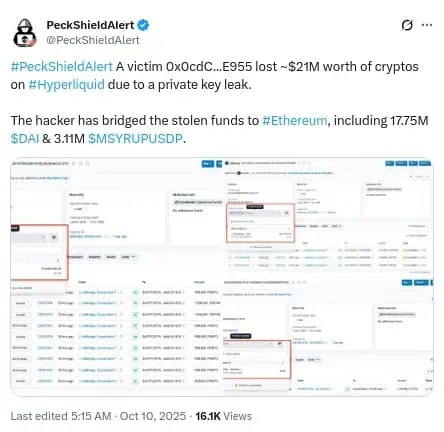
A Hyperliquid user lost $21 million in crypto assets after his private key was leaked. This case highlights the importance of strengthening personal security in the digital world.
Blockchain analytics firm PeckShield reported that a Hyperliquid user suffered the loss of approximately $21 million in crypto assets. The cause was not a vulnerability in the protocol or a direct attack on the platform, but the private key leak of the affected.
The incident, the platform reported, has become one of the largest single thefts recorded on decentralized exchanges this year and has once again brought the importance of secure digital credential management to the forefront of debate.
Create your free account and trade crypto safelyAccording to data Published by PeckShield, the attacker transferred part of the stolen funds to the Ethereum network. Among the stolen assets were 17,5 million DAI, a decentralized stablecoin, and 3,11 million SYRUP, the new native token of the Maple Finance network. The transaction was executed within minutes, reflecting how quickly a personal security error can translate into irreversible losses.

Although the investigation is ongoing, PeckShield has not confirmed how the user's private key was compromised. However, security analysts suggest that the attack may have originated from excessive authorization granted to a smart contract or interaction with a malicious link. In both scenarios, the result is the same: control of the funds passed to the attacker without any infrastructure flaws in the Hyperliquid protocol.
What are private keys and why are they so critical in the crypto world?
To understand the magnitude of this case it is necessary to explain what the private keys in the cryptocurrency ecosystem. A private key is a unique cryptographic string that grants full access to the funds stored in a digital wallet. It functions as the key to a safe: Whoever owns it can move the assets without additional authorization.
Unlike traditional passwords, private keys cannot be reset or recovered through customer service. If they are lost or leaked, funds are permanently exposed. For this reason, private key security is one of the fundamental pillars of cryptoasset custody.
Your security comes first. Enter crypto with Bit2Me.The case of the Hyperliquid user demonstrates that even those who manage large sums of money can make management mistakes. Excessive authorization to a smart contract, for example, allows it unlimited access to the wallet's funds. If that contract is malicious or exploited by a third party, the results can be devastating. Similarly, a fake link mimicking an exchange or wallet interface can trick the user and capture their private key.
Given the existing risks, digital security education becomes vital. Experience shows that measures such as using cold wallets, dividing funds between different addresses, and periodically reviewing active authorizations in smart contracts are effective tools for strengthening protection. These are not foolproof solutions, but they are barriers that can make the difference between suffering a theft and keeping crypto assets safe.

Blockchain Course
Basic levelTake this course where we explain blockchain in a clear, simple and concise way so that you have a very clear idea of what this new technology consists of.
A lesson for the decentralized exchange ecosystem
The theft of $21 million from a Hyperliquid user didn't compromise the technical soundness of the protocol, but it does remind us that security in the crypto ecosystem depends largely on individual decisions. In this emerging market, decentralization offers independence from intermediaries and opens the door to new ways of trading digital assets, but it also requires each user to take an active role in protecting their funds.
Following this incident, the platform continues to operate normally, and no vulnerabilities were detected in its code. However, the incident underscores the need to strengthen digital security practices. Recommended practices include using cold wallets to store large sums, segmenting funds into different addresses, periodically reviewing authorizations granted to smart contracts, and exercising caution when interacting with links or applications from unknown sources.
The financial sovereignty promoted by decentralized finance entails clear benefits, but also responsibilities. Losing a private key means losing access to funds without the possibility of recovery, making cybersecurity education essential for any market participant.
The case reported by PeckShield adds to other episodes in which the lack of protection of private keys resulted in millions of dollars in losses. It should not be forgotten that, as the sector grows, so do the incentives for attackers to seek new ways to exploit human error. Therefore, adopting preventive measures and maintaining responsible management of private keys is not optional. In fact, for those operating in this market, it is the best way to take advantage of opportunities without exposing themselves to unnecessary risks.
Keep your crypto assets protected with maximum security at Bit2Me

